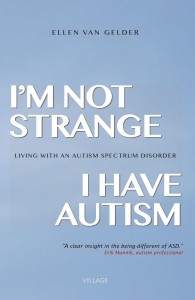 The chapter ‘Co-morbidity’ I found really interesting and I would like to thank you for writing it. You mention depression, anxiety, behavioral disorders and eating disorders, and I think that many people do not realise that these conditions are often linked to an autism diagnosis. Could you explain to our readers a little about living with Tourette and how this affects your everyday life?
The chapter ‘Co-morbidity’ I found really interesting and I would like to thank you for writing it. You mention depression, anxiety, behavioral disorders and eating disorders, and I think that many people do not realise that these conditions are often linked to an autism diagnosis. Could you explain to our readers a little about living with Tourette and how this affects your everyday life?
Ellen. Nice to ask this question! At first I didn’t exactly know how to add Tourette to my book, but it does play a major role in my life. I have had Tourette since I was 7 years old. It became worse all the time. I had multiple physical and vocal tics, especially the motor tics gave me a hard time. I was bullied a lot at high school and it forced me to constantly try to keep my tics under control, a sheer impossible task.
When I was 41 I had a brain operation were they placed electrodes on some parts of my brain. These are connected to a small transmitter that is placed under my skin in my chest, which sends small electric signals. These signals cause a partly break of activity of those parts of my brain that cause my tics.
I was in hospital for three weeks and it was a hell of a job to adjust the transmitter to send the correct amount of signals to my brain. But, it really helped me. I still have the tics, however they are much weaker than before the operation.
You describe in your book how you were bullied as a child during your secondary school years, and this is still very true today for our young people on the spectrum. Did you tell any family members about this and did you think it was your fault? What advice would you give to any child or young person being bullied today?
Ellen. I was very introverted as a kid and a teenager. I didn’t dare to talk to other people about my situation and I became very lonely. I was bullied because of my tics and other kids imitated them, laughed at me. Later I found out that they used my tics to bully me because they didn’t like me due to my autistic behavior. I used to ask lots of questions in classes and was therefore always prominent.
This changed when I was about 17. I went to the local vicar, a young man in his early thirties, who was very understanding. He taught me to talk about myself and my behavior. He also spoke to my parents.
My advice to kids who are bullied is: find someone you can trust. A teacher or someone else. If you don’t dare to talk then write down what is bothering you and give it to this person. And remember: it is never your fault! No one asks to be bullied.
In your chapter Xeno, you describe how individuals on the spectrum are often seen as strangers as they behave differently and can scare people away. Do you prefer to be alone?
Ellen. The older I get, the more I like to be alone. For me it means less stress, doing things the way I want, no need for communication and time to relax. But sometimes I like to have other people around me. My social network is luckily big enough, there is always someone I can call or go to if I need it. And I have my work in the nursing home.

